I have an Irish passport now. I’m officially an Irish citizen.
So…does this make me Irish?
Does citizenship matter?
Does it depend on where you were born and how you speak?
Do you need to speak the language to understand the culture?
Does it depend on which football/soccer team you support?
An essay on identity and belonging: Part 1
This sounds awful and I hate to boast (sorry), but this is my 3rd passport.
Did I apply for Irish citizenship because I feel particularly Irish? (I qualify thanks to my Belfast-born mother.)
Not really.
Hell, until a few years ago, I would ‘protest’ St Patrick’s Day by proudly wearing orange (IYKYK).
And it’s not a political thing, as in, hey, time to burn my American passport and film it.
But I’m conflicted. I feel like a mercenary.
If I’m being honest, it was more of a [politically] pragmatic move. My British passport isn’t as useful in the EU as it used to be for some reason.
For three years, I’ve been classified as a refugee, by dint of being married to a Ukrainian. But who knows how long Ukrainians will be allowed to stay here in Austria legally? (And anyway, we’re divorced now.)
I was trying to explain to my daughter the other day:
“I have Irish blood, daddy?”
“Yes, let’s see…12.5% of your blood is Irish.”
“What does Irish blood look like, is it red, like other blood?”
“Actually, it’s green, white and orange, like the Irish flag.”
“Really?”
“Just joking! As you know from your body book, it could be blue or purple, but different nationalities don’t have different types of blood.”
“Really? What other blood do I have?”
“Other than Irish, you’re 12.5% Welsh, 25% Italian, 45% Ukrainian, and 5% other Slavic.”
“Oh, okay.”
The Tebbit Test
The Tebbit Test was unofficially introduced by Conservative politician Norman Tebbit in 1990. During an interview on immigration and national loyalty, he suggested that immigrants and their children should support England in cricket rather than their ancestral homeland. Cricket, in his mind, was a litmus test for integration.
Basically: If you’re really British, you should cheer for the home team, not the country your parents or grandparents came from: India, Pakistan, Bangladesh or the West Indies, for example.
Naturally, this sparked a massive debate. A lot of people found it ridiculous – reducing identity to which team you support, as if identity isn’t complicated enough, especially in a multicultural country like Britain. But the phrase stuck, and even today, you’ll hear people talk about the “Tebbit Test” when discussing national identity and belonging.
But in sporting and cultural terms, outside of the Olympics and Eurovision, no one is British. You’re English, Scottish, Welsh or Northern Irish.
This is where things get tricky for me.
For most of my life, I supported England in football. It’s where I was born, where I spent much of my childhood, even though I have no English blood. I’ve never felt much of a connection to the US when it comes to soccer.
Paradoxically, despite spending my teenage years in Europe and the UK, I felt more American than anything else. I loved baseball and my dream, one I now cringe at, was to be a professional baseball player. My old man was in the US military so we moved around every three years.
There was no question about where to attend university: I wanted to be in the US and so I headed to Tufts University in Boston.
During my first year, I had friends from all over the place: the UK, India, Israel, Greece, France, Belgium, Bangladesh and, of course, the US.
I had trouble fitting in. I didn’t feel fully American. I missed England, and I really missed the rise of Britpop. I was stuck in America being subjected to the Dave Matthews Band, Blues Traveller and Violent Femmes while Blur, Pulp and Suede were all the rage back home.
Was it ‘home’ though?
That summer, I returned to England and felt mopey and miserable (and I swear it had nothing to do with Amanda dumping me at the start of the summer).
When I returned to Tufts for the start of my second/sophomore year, I was determined to fit in more. I wanted to feel more American.
What’s the most American thing one can do at a university?
Join a fraternity of course!
Friends thought I was nuts and to this day I get told that I’m not the “frat boy” type (a compliment, I think?), but I have no regrets. It was the most fun I never want to have again. One day I’ll share the full inside story, including a description of the delightful game ‘Eat It, Drink It, Wear It’ played during ‘Hell Weekend.’ (use your imagination)
Despite making attempts to integrate into American university life, I couldn’t resist the temptation to spend the autumn term of my third/junior year in London at Westminster University. That was an epic time with my American friend Todd (of Drunken Debauchery in Dublin and Belfast fame).
Accents and language
For a short time as a kid, I had a Belfast accent (“Ach, I had a wee brogue, so I did.”). Then, while living near Ipswich, I had an East Anglian accent (“Ar yer orrite bor?”).
Those accents are gone and even though I’m mistaken for a Canadian a lot (maybe that’s not such a bad thing?) my accent is pretty much American, despite what many of my students over the years think. (“I love your British accent, teacher!” Huh?)
What’s in a name?
Do you know what my nickname was during my final year of high school?
The Stinky King of Lions.
In English class, we did an activity on name origins, learning more about where we came from.
“At the first light of dawn, the king got up and hurried to the lions’ den. When he came near the den, he called to Daniel in an anguished voice, “Daniel, servant of the living God, has your God, whom you serve continually, been able to rescue you from the lions?”
There you go, that’s me in the Bible, thrown into the lions’ den, and that’s about all I know.
My surname, Puzzo? You can guess the origins. Hint: it almost rhymes with pizza, and no, I’m not related to the author of The Godfather. His name is just one z.
Google translate tells me it means ‘stench.’
tells me it has a “cute, almost childish connotation” (thanks – I’ll take it). My former student Ludovica tells me my name “can be translated as a noun (stench) or a verb (I stink). Unfortunately I can't see any cute connotations...but...“What's in a name? That which we call a rose by any other name would smell as sweet! ; )” (now I feel better, thank you Ludovica ☺️)It’s Sicilian in origin and when I’ve travelled to northern Italy, I’ve had questioning looks and someone once muttered under their breath, “dirty Sicilian.” I’ve seen some pretty nasty anti-Sicilian graffiti up north as well, though my experiences in Padua, Verona and Trieste were almost entirely positive (Venice was another story for another time, but that had nothing to do with my name).
It could be worse – in Ukrainian puzo (one z, pronounced puza) means belly. I’ve lost count of the number of people who have told me this.
And it is worse – in Greek, pronounced a certain way, it refers to a part of the male anatomy and it’s VERY RUDE. My Ukrainian readers will recognize it –it’s the word they use for Putin all the time, right here on this beer:
When I was doing my teaching certification (in the US) there was a woman on my course with a surname of Magyar, which literally means Hungarian.
“Have you ever been to Hungary?” I asked her.
“Uh…no. Why?”
“Just wondered. You know, to see your roots. Do you have any relatives there?”
“Huh? Where?”
“Hungary.”
“Hungary? Why are you asking?”
“Well, your surname.”
“What about it?”
“It means Hungarian.”
“Uh…really?”
How can someone get that far in life and not ask questions about their own name? Did no one ever ask her before? Had she never thought about it? Don’t you want to know where you’ve come from?
Back to football, ever-so-briefly
I’m a footballing mess, so what does this say about my identity?
Over the years, I’ve gravitated away from England and drifted towards Northern Ireland. I’ve occasionally been disappointed when the US loses. Having lived in Ukraine for 13 years I’ve often supported them.
But the Republic of Ireland?
In the group stages of the 2002 World Cup, when the Republic of Ireland scored a last-minute equaliser against Germany, my girlfriend was ecstatic on my behalf.
“Why do I care? I’m not Irish!”
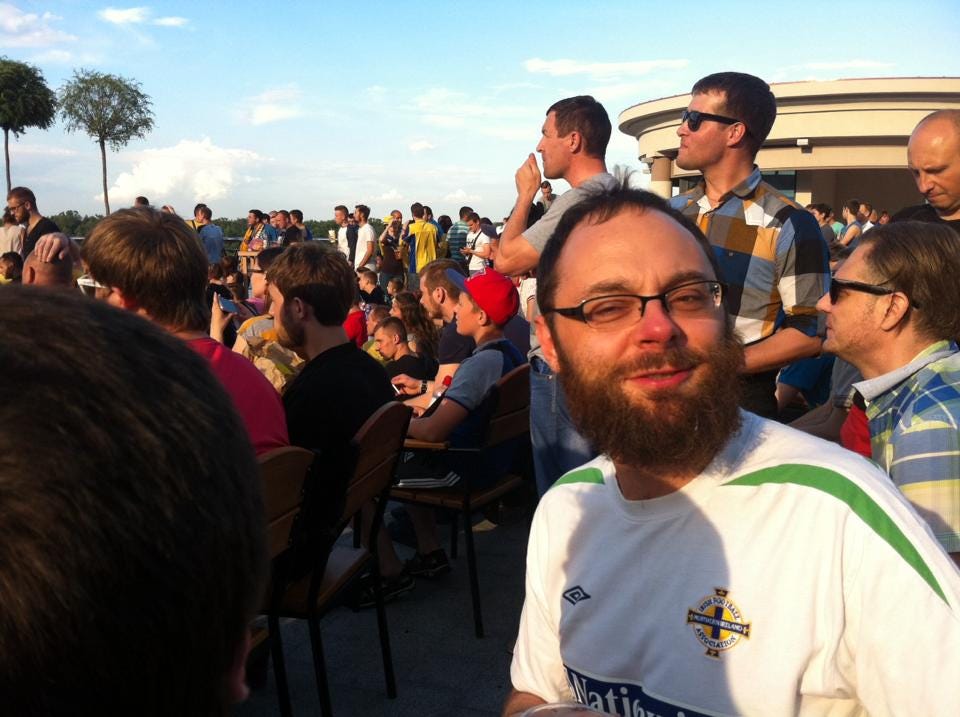
These days I’m probably 65% behind Northern Ireland, 20% England, 9.5% Ukraine and 5.5% US (and I’m happy when Wales or Scotland do well).
How’s my math/maths?
Identity is messy
Strangely, I’ve never felt any allegiances to Italy and I’ve never felt very Italian and I’m not sure why. I barely know the difference between penne and rigatoni for crying out loud. (Mamma mia, non ci credo!)
On the other hand, I do love Italo Calvino and Italo Svevo (and pizza, of course) and I’m about to dive into Luigi Pirandello soon, so…maybe there’s some hope. (Bravo!)
Talk about complicated.
Coming up in part 2: my terrible attempts at language learning. Do you need to speak a language to feel a connection to a country?
And should I learn Irish?
As they say, “Is fearr Gaeilge briste, ná Béarla clíste.”
(“Broken Irish is better than clever English.”)

(Correction: in my previous post, on whisky, I mistakenly credited my brother-in-law with buying me the Isle of Raasay. It was actually my sister who bought it. Whoops.)

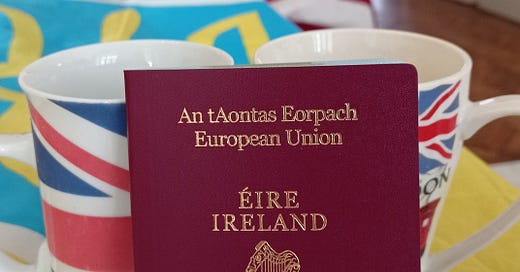


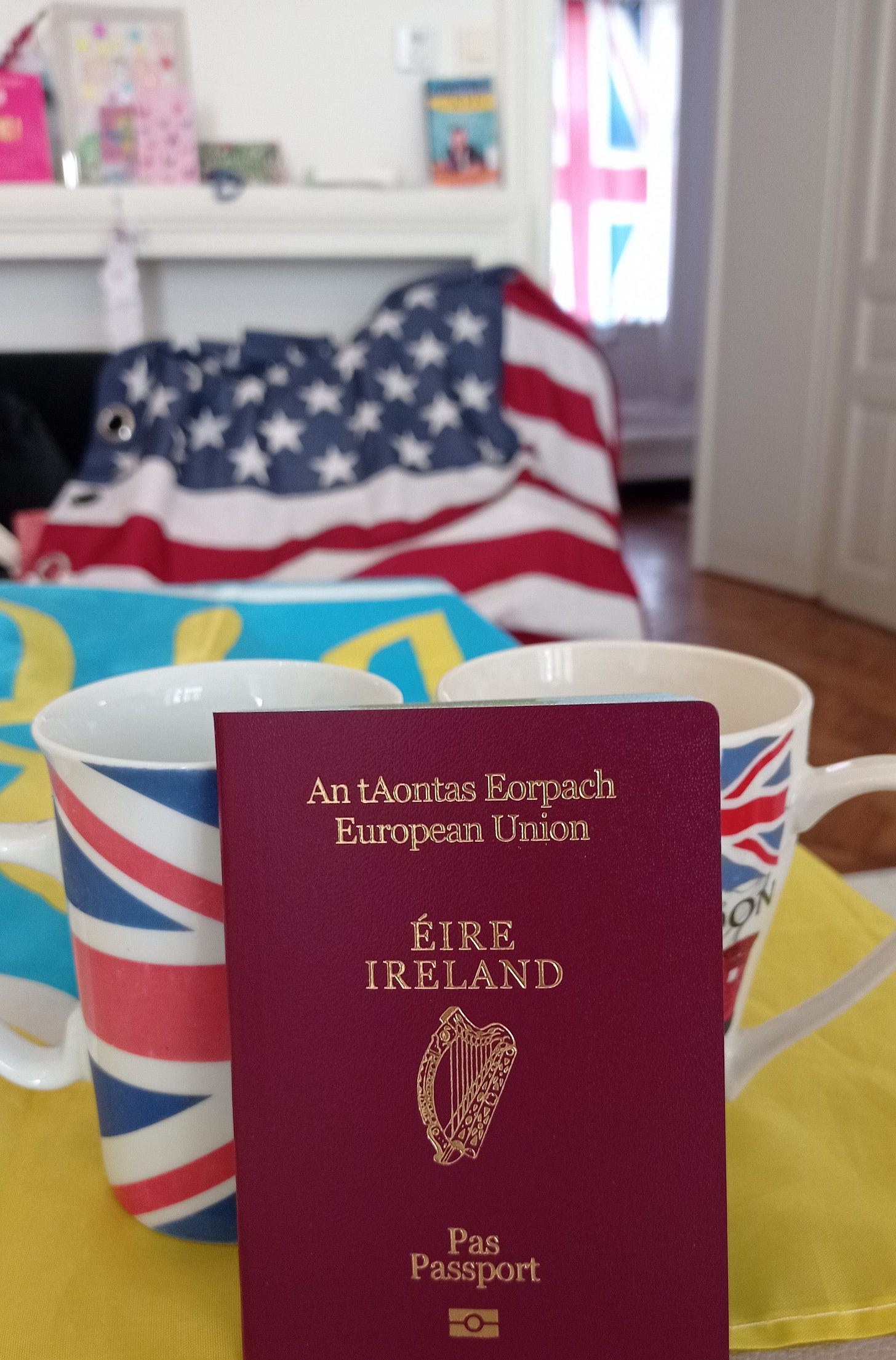
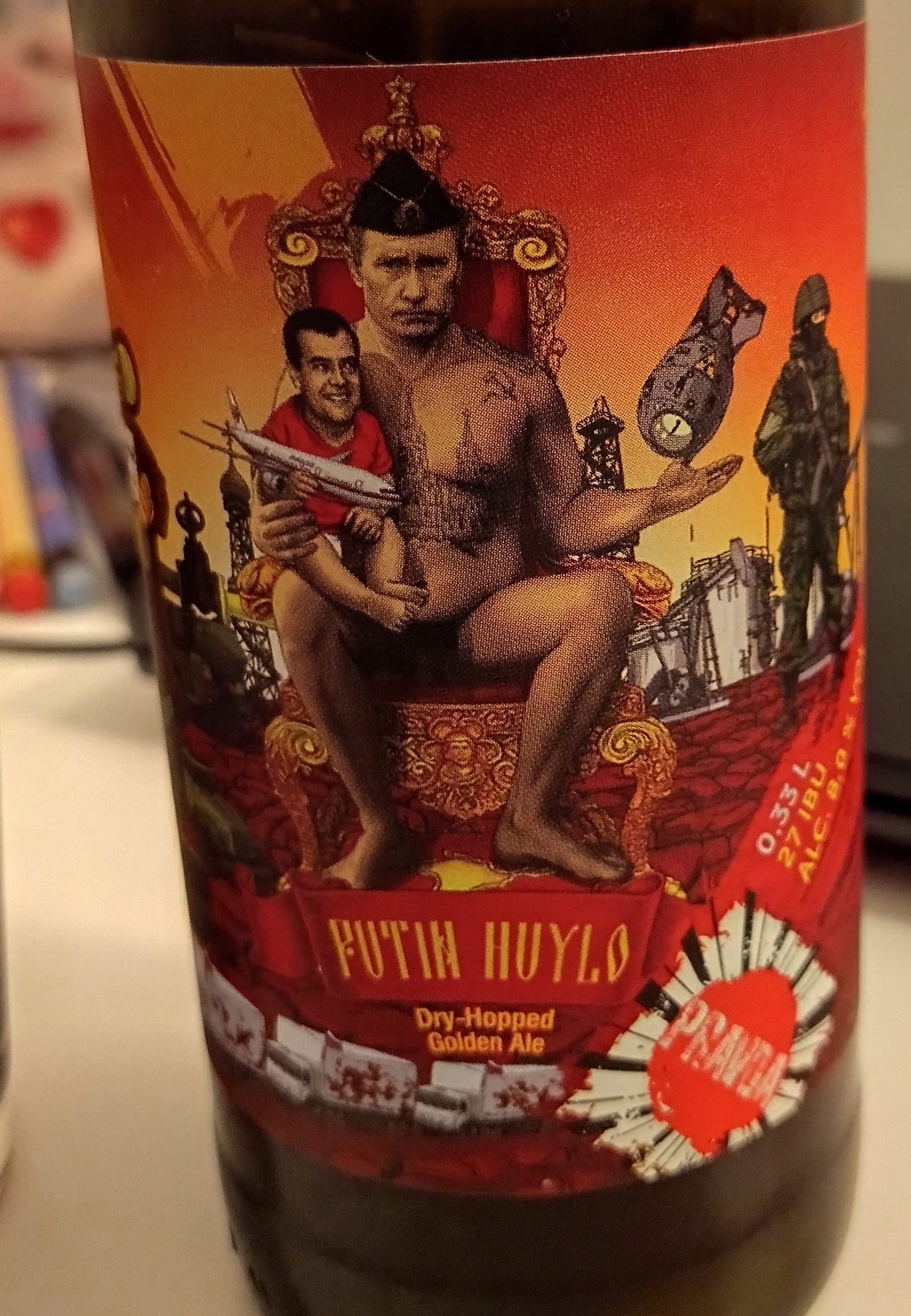
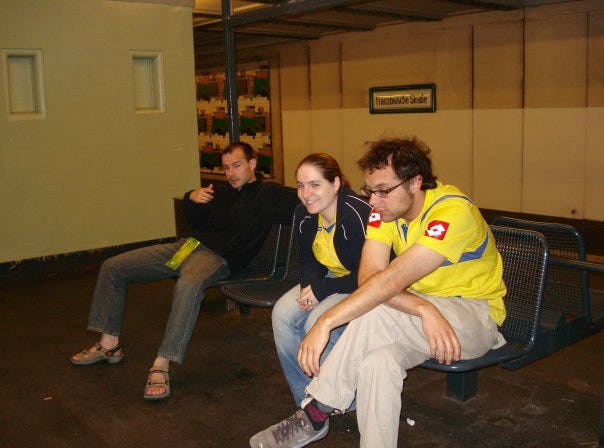
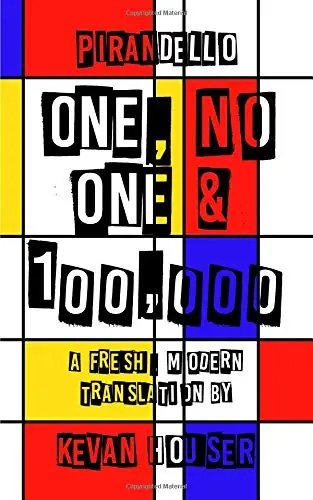
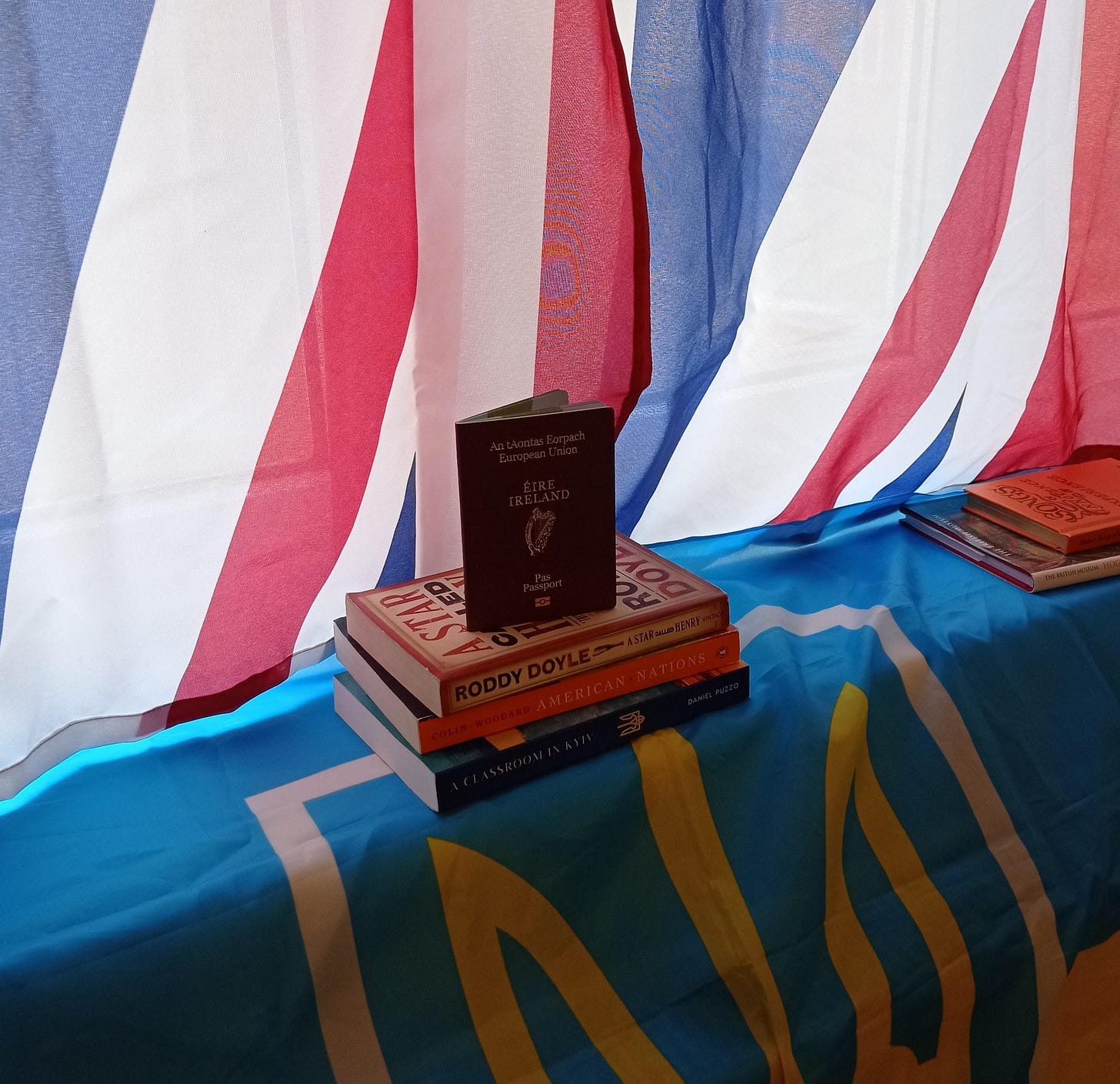
Identity is such a fascinating thing. How much is in our blood, how much in our minds? Our kids have German and US passports. My wife managed to get dual citizenship just before we made the move. Now I’m the only one with just one passport. I’ll always feel American, but I’m thinking I’d also like to get dual citizenship at some point. We’ll see.
Excellent post!
Daniel I felt very seen reading this piece. Identity is very messy. Also names....don't even fucking get me started on names. That's an even bigger shitshow. Someday when I'm not contained by my job I can be more open about some aspects of my life but in terms of my writing but for now suffice to say this was a fantastic read. I think you feel the same way abt identity as I do. I love that. Great read.
Keep on keeping on.